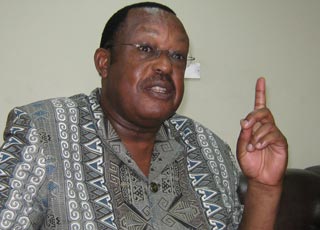
By Patrick Kagenda
As discussions on the East African Common Market protocol closed in Kampala at the beginning of April, the Uganda Manufactures Association (UMA) leaders were meeting Uganda’s first deputy prime minister and minister for East African Community Affairs Eriya Kategaya.
The UMA bosses had one major concern: the East African Common Market which is scheduled to come into force early next year, could wipe them out.
They claimed the low costs of production in Kenya and Tanzania due to distance from the sea disadvantaged Uganda, which is land locked and that competition from cheap Kenyan and Tanzanian goods could collapse Uganda’s manufacturing sector.
Gideon Badagawa, the Executive Director of UMA said although the manufacturers had previously asked for a five year grace period ending this year to help the local industries come up to the level of Kenyan and Tanzanian industries, they now wanted an extension of between two and eight years.
“I can say out of the five years we only used two fruitful years. We are still lagging far behind in policy issues,” he said.
“Uganda’s problem is that government wants to do things alone without involving us the manufacturers which is not the case with Kenya and Tanzania,” he said.
New UMA chairman Kaddu Kiberu said politicians rushed into the Common Market without thinking about the future of the manufacturing sector in Uganda.
He proposed a reversion to the 1960-style agreements where-by member countries would be given special items to produce that would be used in the manufacturing industries to avoid production being concentrated in one country.

Vinay Dawda, the managing director at Britannia Allied Industries expressed concern over power outages and bad roads.
“Its true Uganda has problems with its railway system, shortage of power and method of organisation,” Kategaya said.
Kategaya told the manufacturers that they must become competitive or be ready to be swallowed up by regional industries.
He said unless the regional economies are transformed, they can’t survive for long.
“Integration is on as most people have accepted it as the only way forward but the question is how we do it,” he said.
He said the government would support them but that it was unrealistic to expect an extension of the grace period.
Negotiations on the Common Market Protocol started in July 2006.
The protocol is expected to be ratified in June and January 2010 is the target date for commencement of the Common Market.
The Kampala talks were meant to unblock the so-called “bracketed areas” and have the draft protocol ready for signing by the EAC heads of state during their summit in Arusha on April 26.
Eight rounds of negotiations have taken place in as many months in Kigali, Nairobi, Zanzibar, Bujumbura, Kisumu and Kampala.
Issues under consideration in the recent Kampala round of talks have included residence permits, competition and consumer welfare, common transport policy, cooperation in intellectual property rights, industrialisation, trade in services and interpretations.
Uganda’s main concerns under the Common Market Protocol are access to the sea, rights of residence and establishment in the region, and access to trade market.
Kategaya’s comments do not mean Uganda will not sign the Common Market Protocol. Politicians routinely speak tough in favour of economic integration but usually have to be pushed by regional members to sign the necessary protocols.
Edith Kateme Kasajja, a director at the Ministry of East African Community Affairs and a member of the Uganda negotiating team at the East African Common Market Protocol said UMA has a point about lack of regulations in some sectors, but that those were local issues for the government of Uganda that could not be discussed by the East African Community.
“At the East African Common Market Protocol we discuss principles through regulations and directives,” said Kateme.
Commenting on the unfair regulations, Ali Khan of the Mukwano Group of companies said for nine years, Kenya has exempted manufacturers from tax on import raw materials to grow manufacturing under bond which in Uganda has not been implemented properly.
He said Kenya has no claim-backs while in Uganda many manufacturers have a lot of their money blocked in import duty and Value Added Tax (VAT).
“In Tanzania they now import trucks and vehicles duty free. These are big boosts for Kenya and Tanzania which Uganda will take time to catch up with,” he said.
Suresh Sharma, the regional director (African Operations) at the Mehta Group, expressed fears over the Kenyan extension of the Common Market for East and Southern Africa (Comesa) sugar imports to the East African region duty free.
“If Kenya re-exports the Comesa sugar on addition to its own locally grown sugar to the sister states in the East African community, this will have a devastating effect on the local Ugandan sugar industry,” said Suresh. Suresh’s concerns were based on five major issues the manufacturers are grappling with. Taxes, work productivity, cost of transport into and out of Uganda, the high cost of accessing finance and the high cost of production in Uganda as compared to Kenya and Tanzania.
Although Uganda is a member of Comesa, it has not signed onto the Comesa Free Trade Area and customs union. Uganda’s manufacturers have consistently lobbied the government not to join over similar protectionist fears.
The manufacturers are aware that staying out of the proposed Comesa Union could expose Uganda’s products to higher taxes in the region but are reluctant to compete.
Under the EAC Customs Union to which Uganda is a signatory, raw materials and capital goods are zero rated for tax, while intermediate products attract a common external tariff of 10% and finished good 25%.
In 2005 when the EAC Customs Union came into effect, Ugandan manufacturers protested against it and filed a list of 100 products they wanted to be tax exempted.
The common market is a customs union with common policies on product regulation, and freedom of movement of capital, labour, goods, and services between the members is as easy as within them.
It is different from a single market which removes borders, technical, and fiscal barriers among the member states.
Ugandan manufacturers are not alone in opposing the signing of the Common Market Protocol.
According to The Citizen newspaper, Tanzania’s East African Cooperation deputy minister Mohammed Aboud said it was opposed to putting land issues in the protocol.
“This is a sensitive issue on which we cannot let others bulldoze us,” he is quoted to have said.
Land is owned by the government in Tanzania while it could be owned by an individual in Uganda.
Julius Onen, the deputy secretary general of the EAC in charge of Projects and Programs said, however, that up to 90% work on the protocol was complete.
In spite of that progress, the fate of the Common Market Protocol remains in the balance because of uncertainty over how the government will react to the UMA demand for another extension of the grace period.
 The Independent Uganda: You get the Truth we Pay the Price
The Independent Uganda: You get the Truth we Pay the Price


